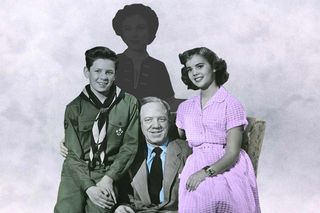
When The Photographer Is Always Mom
An old family photo, and present-day conversations, reveal women have been out of the picture for a very long time.

My great aunt was an enthusiastic amateur photographer who loved to take photographs of everything and everyone around her. When she died, I inherited her huge collection. One rainy afternoon, I sat down with the box of photographs and sorted through them. There were photographs of the family, smiling into the camera as they ate, or traveled, or simply relaxed at home; there were photographs of her only son who had died at the age of 21, leaving her bereft in a way she would never recover from; there were photographs of her husband sitting proudly in his car, or fiddling with radios (his obsession).
I was charmed by the deep dive into my extended family’s past. But I couldn’t help noticing: There were no photographs of her, at all. Not with her husband, not with her son, and not with her extended family. She had been so busy documenting her world, but hadn’t found space in it for herself.
Curious as to whether my friends form part of their families’ visual narratives in today’s world, I began paying more attention to social media. I discovered mums still tend to take the pictures of their children and families, leaving themselves out of the stories they tell. Once in a while, I find that mothers make an effort to be in pictures, but overwhelmingly they’re absent.
She had been so busy documenting her world, but hadn’t found space in it for herself.
“Selfies are the only way that I appear in photos with my kids,” explains my friend Stace Irving. “My husband isn’t big on photography, and he rarely photographs me — perhaps never without being asked, which again [like selfies] leads to posed or artificial shots. There are almost no candid photos of me with the kids, so when I look back, what I’ll see is my own deliberate effort to capture moments, without seeing the authenticity of the moments themselves.” She says she feels mildly irritated about it, but not enough to have a conversation with her husband about the subject.
This is, perhaps, because women are used to being absent from narratives. A mother missing from a photograph is a symbol of women missing in society as a whole. Amid a global movement to draw attention to the lack of stories about and by women it may be that women, not seeing themselves in stories, movies, and art, thereby believe the covert messaging that women don’t belong there.
When women are depicted, they tend to fit a certain type. It’s a type that has been dinned into us from the time we’re little. There are expectations heaped upon us to look perfect, behave demurely, and be a certain way, and these are very different from what society expects of men. Women are told that we have to conform to these expectations, and it is in this conformity that our self-worth lies.
“There are almost no candid photos of me with the kids.”
I hear echoes of this when I talk to my friend Rebecca Scott, who takes a lot of pictures of her kids, but almost never appears in any of them herself. She explained to me that she’s too self-conscious to appear in photographs because her body has changed; she’s larger now than she used to be. “I don’t like looking at myself in photographs, but now that you’ve pointed it out I guess it is sad if I don’t appear in them, particularly for my children and for me down the line.”
I hear this chorus repeated all the time. One friend, Leena-Trivedi Grenier, gets professional photographs taken of her family every year, just to ensure she’s in them.
“I try to keep in mind that I will want to look back at myself with my family in photos when I am older, and that often, my view of myself isn’t always accurate. It’s difficult to want to smile and document yourself when you aren’t feeling great about how you look,” she says. “But I keep telling myself that my kids will want to remember me for how I look at this point in time, so I force myself to take photos, and then try my best not to get mad at the results when I don’t look super skinny. I want to love myself so my kids, especially my daughters, will learn to love themselves no matter how they look or feel.”
“It’s difficult to want to smile and document yourself when you aren’t feeling great about how you look.”
To get comfortable with the limelight alongside her family, Leena chose to have the photographer document an experience, not just the people. “I’m a food writer, I’m passionate about food, and so food plays a large role in my family life as well,” she says. “We cook and eat together, so I decided to do an annual family photo of us eating together. Instead of worrying about how much baby weight is still on my frame, or how tired I look, I get to focus on what my family will eat each year.”
When women are left out of the picture, their shapes don’t get normalized, their stories don’t get told. Women’s work, especially in the home, is quiet and taken for granted. Women belong in front of cameras as well, celebrating the day-to-day with their children. No one disagrees with that, but no one else picks up the camera, either.
“Maybe I’ll make more of an effort now to ensure that I do appear in pictures,” Rebecca says.
Which reminds me of an old proverb — that a woman’s work is never done.
Awanthi Vardaraj lives and writes in the port city of Chennai, India. She has written for publications such as the BBC, NPR, Saveur, Buzzfeed, and Playboy, and collects her work at www.awanthi.com.
Related


Conservatives and Liberals Hold Different Views on the Meaning of Life
